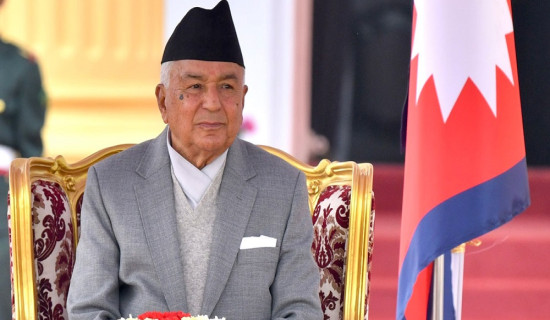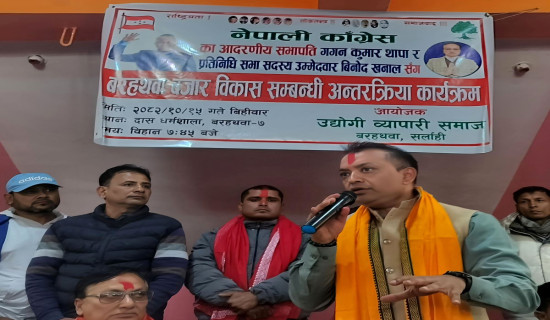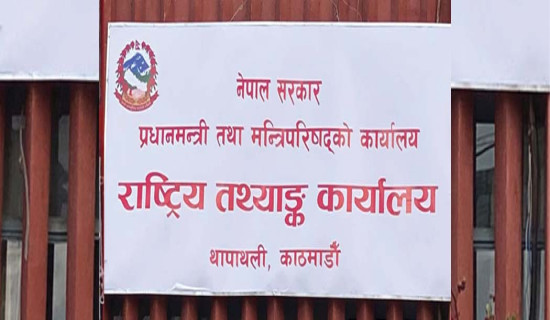- Friday, 30 January 2026
Govt aims to transform agriculture through mechanisation
Kathmandu, May 5: In a major policy shift aimed at achieving self-reliance in agriculture and ensuring food security, the government has unveiled a comprehensive agricultural modernisation plan that seeks to transform the sector through mechanisation and specialisation.
Through the policy and programmes of the government for the upcoming fiscal year made public on Friday, the government has pledged to modernise and commercialise the existing subsistence agriculture through the mechanisation and specialization aiming to make the country self-reliant in agriculture.
The multi-pronged strategy emphasises attracting youth to agriculture by creating a strong ecosystem of land access, agricultural equipment, insurance coverage, and guaranteed markets, read the policy document.
A dedicated pilot project will soon be launched for aspiring agri-entrepreneurs, supported by local financial institutions that will provide finance and machinery using the project itself as collateral. "Land availability will be ensured through a Land Bank. Finance and equipment will be provided through local financial institutions against the projects themselves as collateral," the policy document read.
According to the policy and programmes, business risks will be addressed and markets will be ensured by means of protection against unforeseen loss and purchase agreements at minimum support price for agricultural produce. To increase agricultural production and productivity, food security, and farmer's income, the government has planend to launch targeted programmes on key crops, livestock, and fisheries.
Farmers will gain certainty through minimum support prices and advance purchase agreements, securing income before seeds are even sown, read the policy document. The government advanced the plan to promote Pushpalal Mid-Hill Highway, Madan Bhandari Highway, B.P. Highway, Postal Highway and corridors as economic corridors based on green businesses.
The Prime Minister Agriculture Modernisation Project will be restructured and continued as National Integrated Agriculture Modernization Programme, said the government.
The policy document said that a special programme will be conducted to promote sustainable agricultural production and utilisation system by encouraging the production and use of organic fertilisers to prevent deterioration in the biological properties of the soil.
The distribution process, price and supply of chemical fertilisers will be revised and necessary works will be undertaken to establish an agricultural fertiliser factory.
The government said that import and use of chemicals and pesticides will be regulated to minimise its impact on human health and biodiversity loss due to their excessive use.
In the meantime, the use of organic pesticides will be encouraged, it said.
The scope of existing accreditation of agricultural, livestock and food laboratories will be expanded and upgraded to internationally accredited laboratories.
Conservation of arable land, utilisation of fallow land, land consolidation and contract farming will be promoted and appropriate technology will be used to minimise the loss caused by wild animals.
The government will give priority to the preservation of indigenous crops, seeds, species and agricultural biodiversity.
Agricultural production, distribution, storage and consumption patterns will be promoted as an integral part of nutrition, said the government.
According to the policy document, digital system will be developed to make agricultural services accessible and transparent and quarantine and laboratory services will be upgraded.
The government has committed to make agricultural research farmer-friendly and result-oriented by restructuring the Nepal Agricultural Research Council.
Production and export of dairy, wool, and meat products will be promoted.
Vaccination programme will be conducted to control animal and poultry diseases and the production of vaccines required for Nepal will be encouraged, said the policy document.
The government expressed its commitment to take measures to ensure that only genuine farmers receive the benefits of subsidies given in the agricultural sector.
"The scope of agricultural insurance will be expanded. Concessional loans and service facilities together with identity cards will be provided to the indigent farmers," said the policy document.
The government said that the service and facilities receivable by farmers will be linked with the national identity card.
For commercial farming, a minimum support price will be determined before planting crops, and an advance agricultural produce purchase agreement will be made after planting, it said.

















